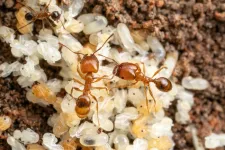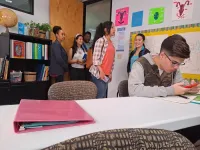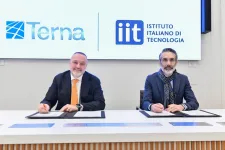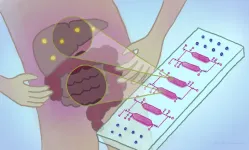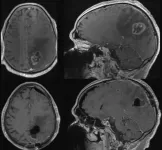(Press-News.org) PHILADELPHIA – The American Association for Cancer Research (AACR) today announced its newly elected class of Fellows of the AACR Academy.
The mission of the AACR Academy is to recognize and honor distinguished scientists whose scientific contributions have propelled significant innovation and progress against cancer. Fellows of the AACR Academy serve as a global brain trust of top contributors to cancer science and medicine who help advance the mission of the AACR to prevent and cure all cancers through research, education, communication, collaboration, science policy and advocacy, and funding for cancer research.
All Fellows are nominated and elected through an annual, multi-step peer review process that involves a rigorous assessment of each candidate’s scientific accomplishments in cancer research and cancer-related sciences. Only individuals whose work has had a significant and enduring impact on cancer research are considered for election and induction into the AACR Academy.
“We are proud to announce the election of 23 new Fellows of the AACR Academy. These individuals from across the world have all made significant and groundbreaking contributions to cancer research,” said Margaret Foti, PhD, MD (hc), chief executive officer of the AACR. “The 2023 class of Fellows includes pioneers from numerous scientific disciplines who have collectively shaped our understanding and treatment of cancer. We are deeply honored to have them join our 289 existing Fellows and look forward to celebrating their extraordinary scientific achievements at our upcoming Annual Meeting.”
The members of the 2023 class of Fellows of the AACR Academy are:
Carolyn R. Bertozzi, PhD
The Baker Family Director of Sarafan ChEM-H, the Anne T. and Robert M. Bass Professor in the School of Humanities and Sciences, Professor of Chemistry and, by courtesy, of Chemical and Systems Biology and of Radiology, Stanford University; Investigator, Howard Hughes Medical Institute, Stanford, California
For visionary contributions to the Nobel Prize-winning development of click chemistry through the invention of bioorthogonal chemistry; for profiling alterations in cell surface glycosylation associated with cancer, inflammation, and bacterial infection; and for spearheading the development of novel therapeutic modalities for immuno-oncology.
Stephen J. Chanock, MD
Director, Division of Cancer Epidemiology and Genetics, National Cancer Institute, Bethesda, Maryland
For pioneering efforts dedicated to defining detectable clonal mosaicism and for impactful research focused on the discovery and characterization of cancer susceptibility regions in the human genome, directly enhancing our understanding of the association between inherited genetic variants and cancer risk.
George Coukos, MD, PhD
Director, Department of Oncology, Lausanne University Hospital; Director, Lausanne Branch, Ludwig Institute for Cancer Research, Lausanne, Switzerland
For seminal contributions to characterizing the occurrence of spontaneous immune responses in ovarian tumors, for demonstrating that tumor-infiltrating lymphocytes may function as strong predictors of enhanced ovarian cancer survival, for identifying fundamental mechanisms regulating T-cell infiltration in cancers and the regulatory function of the tumor endothelial barrier, and for designing and implementing rational immunotherapy clinical trials leveraging the above mechanisms.
Hugues de Thé, MD
Professor, Chair of Molecular and Cellular Oncology, Collège de France, Paris, France
For unparalleled investigations into identifying the molecular drivers of promyelocytic leukemia and developing targeted and curative treatments involving retinoic acid and arsenic that have radically transformed the clinical management of this disease.
Julian Downward, PhD
Principal Group Leader and Associate Research Director, The Francis Crick Institute, London, United Kingdom
For pioneering research leading to the discovery of the epithelial growth factor receptor as the ErbB oncogene product, paving the way for development of drugs targeting EGFR and ErbB2/HER2 in lung, colon, and breast cancers; and for defining RAS/RAF and RAS/PI3K signaling pathways as critical drivers of cancer cell growth.
Laura J. Esserman, MD, MBA
Alfred A. de Lorimier Endowed Chair in General Surgery, University of California, San Francisco (UCSF); Professor, Departments of Surgery and Radiology; Director, UCSF Breast Care Center; Co-Leader, Breast Oncology Program, UCSF Helen Diller Family Comprehensive Cancer Center, University of California, San Francisco, California
For steadfast commitment to breast cancer research; her pivotal role as the architect of the Athena Breast Health Network, which gave rise to the WISDOM study, a trial of annual vs. personalized screening and prevention that has enrolled over 50,000 women; for the development of new and improved methods to classify tumor subtypes and determine optimal treatment escalation and/or de-escalation; and for visionary leadership of the I-SPY2 adaptive neoadjuvant platform trial for women with stage 2/3 breast cancer—the longest-running platform trial in cancer—which has tested 24 agent combinations over 12 years.
Keith T. Flaherty, MD
Professor of Medicine, Harvard Medical School; Director of Clinical Research, Dana-Farber/Harvard Cancer Center, Massachusetts General Hospital, Boston, Massachusetts
For groundbreaking translational discoveries and seminal contributions to the development of vemurafenib and other therapeutic agents for the treatment of melanoma, translating investigations of the BRAF V600E somatic mutation in cancer into effective therapies, including the FDA-approved five-drug series for melanoma.
Andy Futreal, PhD
Professor and Chair, Department of Genomic Medicine, Division of Cancer Medicine; Vice President, Strategic Translational Programs; Sheikh Mohamed Bin Zayed Al Nahyan Distinguished University Chair in Cancer Research, The University of Texas MD Anderson Cancer Center, Houston, Texas
For unrivaled research efforts involving large-scale systematic cancer genomics that identified breast and ovarian cancer susceptibility genes and multiple human cancer genes, notably the landmark discovery of BRAF mutations in melanoma—a discovery that led to the development and rapid approval of the first effective targeted therapy for advanced melanoma.
Judy Lieberman, MD, PhD
Professor of Pediatrics, Harvard Medical School; Endowed Chair in Cellular and Molecular Medicine, Boston Children’s Hospital, Boston, Massachusetts
For fundamental research contributions to the field of cancer immunology that have contributed to understanding cytotoxic T lymphocytes, key effector cells in antitumor immunity; for the discovery of T-cell exhaustion in humans; and for innovative work describing the molecular basis of inflammatory cell death (pyroptosis) that is immunogenic and may be exploited to enhance antitumor immunity.
Patricia M. LoRusso, DO, PhD (hc)
Professor of Medicine (Medical Oncology); Chief, Experimental Therapeutics; Associate Cancer Center Director, Experimental Therapeutics, Yale Cancer Center and Smilow Cancer Hospital, New Haven, Connecticut
For unrivaled clinical cancer research contributions including expertly and extensively designing and executing innovative early-phase clinical trials; and for improving therapeutic outcomes to not only reduce mortality rates, but also enhance the quality of life for patients with cancer.
Luis F. Parada, PhD
Member, Cancer Biology and Genetics Program, Sloan Kettering Institute; Albert C. Foster Chair; Director, Brain Tumor Center, Memorial Sloan Kettering Cancer Center; American Cancer Society Research Professor; Professor, Cell and Developmental Biology Program, Weill Cornell Graduate School of Medical Sciences, New York, New York
For illuminating research contributions involving the integration of molecular genetics, embryonic development, and signal transduction to understand nervous system tumors; and for pioneering the development of mouse models specifically designed for the investigation and development of glioblastoma multiforme therapies.
Dana Pe’er, PhD
Chair and Professor, Computational and Systems Biology Program, Sloan Kettering Institute; Scientific Director, Alan and Sandra Gerry Metastasis & Tumor Ecosystems Center, Memorial Sloan Kettering Cancer Center; Investigator, Howard Hughes Medical Institute, Professor, PhD Program of Physiology, Biophysics and Systems Biology, Weill Cornell Medicine Graduate School of Medical Sciences, New York, New York
For fundamental contributions to the development of computational methods and algorithms that, when combined with high throughput experimental techniques, have provided key insights into the impact of genetic aberrations on molecular networks responsible for the onset and progression of various cancer malignancies.
Charles M. Perou, PhD
The May Goldman Shaw Distinguished Professor of Molecular Oncology; Co-Director of the Computational Medicine Program; Co-Director of the UNC Lineberger Breast Cancer Research Program; Professor, Department of Genetics, University of North Carolina, Lineberger Comprehensive Cancer Center, Chapel Hill, North Carolina
For laudable research contributions that have led to the identification of intrinsic breast cancer subtypes, including the basal-like/triple-negative breast cancer subtype; and for the development of clinical diagnostic tests that are now widely used to stratify breast cancer patients based on the molecular characteristics of their tumors.
Helen Piwnica-Worms, PhD
Professor of Experimental Radiation Oncology, Department of Experimental Radiation Oncology; Senator A.M. Aikin Jr. Distinguished Chair; American Cancer Society Research Professor, The University of Texas MD Anderson Cancer Center, Houston, Texas
For outstanding efforts dedicated to the identification of protein kinases and phosphatases that regulate CDK1; the discovery that Wee1 directly phosphorylates and inhibits CDK1, revealing that CHK1 can be targeted by the synthetic derivative of staurosporine, UCN-01; and for the discovery of signaling pathways involving 14-3-3 proteins responsible for cell cycle checkpoint control.
Thomas M. Roberts, PhD
Professor of Biological Chemistry and Molecular Pharmacology, Harvard Medical School; Professor, Department of Cancer Biology, Dana-Farber Cancer Institute, Boston, Massachusetts
For instrumental contributions to elucidating the tyrosine kinase signaling pathways critical for tumorigenesis, with particular emphasis on PI3K; and for ushering in the age of precision medicine through fundamental discoveries of signaling mechanisms capable of regulating cell growth, knowledge that has been subsequently applied to the development of transformative cancer therapies.
Erkki Ruoslahti, MD, PhD
Distinguished Professor Emeritus, Sanford Burnham Prebys, La Jolla, California
For paramount discoveries involving the mechanisms of cellular adhesion; for the co-discovery of fibronectin, the discovery of the fibronectin RGD cell attachment sequence, homing peptides, and tumor-penetrating peptides; and for the development of therapeutics for vascular thrombosis and cancer.
Michel Sadelain, MD, PhD
Member, Immunology Program, Sloan Kettering Institute; Stephen and Barbara Friedman Chair; Director, Center for Cell Engineering, Memorial Sloan Kettering Cancer Center; Professor, PhD Program of Immunology and Microbial Pathogenesis, Weill Cornell Medicine Graduate School of Medical Sciences, New York, New York
For unparalleled contributions to the conceptualization and optimization of chimeric antigen receptor (CAR) T cells, including engineering CARs that provide enhanced proliferation, survival, and potency to T cells, identifying CD19 as a target for CAR therapy, and designing CD19 CAR therapies for patients with relapsed, refractory acute lymphoblastic leukemia.
Kevan M. Shokat, PhD
Professor and Vice Chair, Department of Cellular and Molecular Pharmacology, University of California, San Francisco; Investigator, Howard Hughes Medical Institute, Chevy Chase, Maryland; Professor of Chemistry, University of California, Berkeley, Berkeley, California
For revolutionary discoveries in the field of chemical genetics, including pioneering work to develop the first covalent inhibitors of KRAS G12C capable of therapeutically targeting a once-undruggable oncogene, which led to clinical trials involving various cohorts of lung, colon, and pancreas cancer patients and which notably expanded the armamentarium of available agents to combat cancer.
Andreas Strasser, PhD
Division Head, Division of Blood Cells and Blood Cancer, WEHI (Walter and Eliza Hall Institute of Medical Research), Parkville, Victoria, Australia
For trailblazing research devoted to identifying connections between apoptosis, autoimmunity, and cancer, including genetic studies that established BCL-2-related BH3-only proteins as being vital for inducing mitochondrial apoptosis; and for demonstrating that dysregulation of apoptosis can lead to cancer, autoimmune disease, and impaired therapeutic responses in cancer cells.
Jean Y. J. Wang, PhD
Distinguished Professor Emeritus, Department of Medicine and Biology, University of California San Diego School of Medicine, La Jolla, California
For critical research that has been vital to elucidating the mechanisms by which cells respond to various intracellular and extracellular stimuli, including how cancer cells manage to evade such signals to avoid cell death; and for efforts to define the various cellular functions of the c-Abl tyrosine kinase proto-oncogene and the retinoblastoma tumor suppressor protein.
Robert A. Winn, MD
Director and Lipman Chair in Oncology, Virginia Commonwealth University Massey Cancer Center; Senior Associate Dean, Cancer Innovation; Professor, Pulmonary Disease and Critical Care Medicine, Virginia Commonwealth University School of Medicine, Richmond, Virginia
For heralded contributions to lung cancer research, cancer and health disparities, and community-based health care, including characterizing the molecular mechanisms that drive cellular proliferation and the role of senescence in lung cancer; and for dedicated efforts to champion health equity and access to care among underserved, high-risk cancer populations.
Jedd Wolchok, MD, PhD
Meyer Director, Sandra and Edward Meyer Cancer Center, Weill Cornell Medicine; Professor of Medicine, Co-Director, Ludwig Collaborative Laboratory, Weill Cornell Medicine, New York, New York
For illustrious contributions to novel cancer immunotherapy strategies, such as demonstrating the benefits of checkpoint inhibitor therapy in melanoma; and for leading several pivotal clinical trials, including the phase I clinical trial for ipilimumab and the phase III clinical trial involving the combination of ipilimumab and nivolumab.
Catherine J. Wu, MD
Professor of Medicine, Dana-Farber Cancer Institute and Harvard Medical School; Chief, Divisionof Stem Cell Transplantation and Cellular Therapies, Dana-Farber Cancer Institute; Institute Member, Broad Institute of Massachusetts Institute of Technology and Harvard University, Boston, Massachusetts
For groundbreaking discoveries involving immunogenic antigen targets; for developing genomic-guided immunotherapy and neoantigen-targeting cancer vaccines; and for translating these research findings into early-phase clinical trials designed to ascertain the clinical viability of personalized tumor vaccines in melanoma and glioblastoma patients.
AACR ACADEMY ELECTS NEW PRESIDENT
The Fellows of the AACR Academy have elected Elizabeth M. Jaffee, MD, FAACR, as their next President. She will assume the presidency during the AACR Annual Meeting 2023, to be held April 14-19 at the Orange County Convention Center in Orlando, Florida.
Jaffee is the Dana and Albert “Cubby” Broccoli Professor in oncology and deputy director of the Sidney Kimmel Comprehensive Cancer Center (SKCCC) at Johns Hopkins University, as well as inaugural director of the Convergence Institute and associate director of the Bloomberg~Kimmel Institute for Cancer Immunotherapy at SKCCC. She is also a professor of pathology at the Johns Hopkins University School of Medicine, codirector of the Skip Viragh Center for Pancreas Cancer Clinical Research and Patient Care, and deputy director of the Johns Hopkins Institute for Clinical and Translational Research.
Jaffee was inducted into the AACR Academy in 2018 and served as AACR President for the 2018-2019 term. She was recently announced as the recipient of the 2023 AACR-Margaret Foti Award for Leadership and Extraordinary Achievements in Cancer Research in recognition of her exceptional leadership, outstanding record of service to the cancer community, and brilliant scientific discoveries.
END
AACR announces Fellows of the AACR Academy Class of 2023 and new AACR Academy President
2023-04-07
ELSE PRESS RELEASES FROM THIS DATE:
In Florida study, nonnative leaf-litter ants are replacing native ants
2023-04-07
CHAMPAIGN, Ill. — A new look at decades of data from museum collections and surveys of leaf-litter ants in Florida reveals a steady decline in native ants and simultaneous increase in nonnative ants – even in protected natural areas of the state, researchers report.
The study tracked leaf-litter ant abundance from 1965 to 2019. Nonnative ants represented 30% of the 177 ground-dwelling species detected in surveys across the state in later years, the team reports. Their dominance grew most notably in southern Florida, where ...
Woolly mammoths evolved smaller ears and woolier coats over the 700,000 years that they roamed the Siberian steppes
2023-04-07
A team of researchers compared the genomes of woolly mammoths with modern day elephants to find out what made woolly mammoths unique, both as individuals and as a species. The investigators report April 7 in the journal Current Biology that many of the woolly mammoth’s trademark features—including their woolly coats and large fat deposits—were already genetically encoded in the earliest woolly mammoths, but these and other traits became more defined over the species’ 700,000+ year existence. They also identified a gene with several mutations that may have been ...
Efficacy, safety of anakinra plus standard of care for patients with severe COVID-19
2023-04-07
About The Study: In this randomized clinical trial, anakinra did not prevent the need for mechanical ventilation or reduce mortality risk compared with standard of care alone among hospitalized patients with severe COVID-19 pneumonia. Future research should assess anakinra in patients with less severe pneumonia.
Authors: Patricia Fanlo, M.D., Ph.D., of the Hospital Universitario de Navarra in Pamplona, Spain, is the corresponding author.
To access the embargoed study: Visit our For The Media ...
Severe maternal morbidity, mortality of pregnant patients with COVID-19 infection during early pandemic period
2023-04-07
About The Study: This national-level analysis found substantial adverse maternal outcomes among pregnant patients with COVID-19 infection at delivery during the early pandemic in the U.S. Specifically, the odds of severe respiratory complications were increased among pregnant patients with COVID-19 infection at delivery.
Authors: Koji Matsuo, M.D., Ph.D., of the University of Southern California in Los Angeles, is the corresponding author.
To access the embargoed study: Visit our For The Media website at this link https://media.jamanetwork.com/
(doi:10.1001/jamanetworkopen.2023.7149)
Editor’s ...
Researchers find comprehensive sex education reduces homophobia, transphobia
2023-04-07
Can a school-based sexual health education program that effectively reduces the risk of unintended pregnancy and STIs also decrease homophobia and transphobia?
That question drove a collaborative effort by researchers conducting a randomized controlled trial of an inclusive comprehensive sex education program – High School FLASH. The study evaluated not just the impact on students’ sexual behaviors and related outcomes but also on their homophobic and transphobic beliefs (Coyle et al., 2021). With funding from the U.S. Department of Health and Human Services, researchers evaluated High School FLASH in 20 schools in two U.S. regions (Midwest and South). ...
Terna and Istituto Italiano di Tecnologia together for innovation and research
2023-04-07
Rome (Italy), 7th April 2023 - Terna, the company led by Stefano Donnarumma that manages the national transmission grid, and Istituto Italiano di Tecnologia (IIT- Italian Institute of Technology) have signed a five-year collaboration agreement aimed at studying and implementing innovative solutions in the field of robotics to support the company's field activities.
The agreement was signed on April 6th in Rome by Massimiliano Garri, Terna's Head of Innovation & Market Solutions, and Giorgio Metta, IIT Scientific Director.
"We are proud to start the collaboration with an excellence on the Italian ...
Two-organ chip to answer fatty liver questions
2023-04-07
A new chip that holds different cell types in tiny, interconnected chambers could allow scientists to better understand the physiological and disease interactions between organs. The integrated-gut-liver-on-a-chip (iGLC) platform was designed by scientists at Kyoto University’s Institute for Integrated Cell-Material Sciences (iCeMS), to improve understanding of non-alcoholic fatty liver disease (NAFLD). The researchers, together with colleagues in Japan, published their findings in the journal Communications ...
Retinal microvasculature is a potential biomarker for acute mountain sickness
2023-04-07
This study is led by Dr.Ningli Wang and Dr.Yuan Xie (Beijing Tongren Hospital, Capital Medical University), they provide evidence that retinal microvasculature is a potential biomarker for cerebral microvasculature changes and acute mountain sickness(AMS) development during risk assessment of individuals at high altitudes.
Since the retinal and cerebral vasculature share many morphological and physiological characteristics, direct evaluation of the more accessible retinal vasculature should theoretically provide insights into the cerebral circulation. Therefore, the role of retinal imaging ...
Researchers leverage cell self-destruction to treat brain tumors
2023-04-07
CHAPEL HILL, N.C. – Glioblastoma is the most common type of brain tumor in adults. The disease is 100% fatal and there are no cures, making it the most aggressive type of cancer. Such a poor prognosis has motivated researchers and neurosurgeons to understand the biology of tumors with the goal of creating better therapies.
Dominique Higgins, MD, PhD, an assistant professor in the Department of Neurosurgery, has heeded the call. Higgins and a team of researchers at Columbia University have found ...
Deaths by suicide increase significantly during the week of a full moon
2023-04-07
INDIANAPOLIS—For centuries, people have suspected a full moon in the sky to cause mysterious changes in people. Now, psychiatrists at Indiana University School of Medicine have found deaths by suicide increase during the full moon.
“We wanted to analyze the hypothesis that suicides are increased during the period around full moons and determine if high-risk patients should be followed more closely during those times,” said Alexander Niculescu, MD, PhD.
Niculescu and his team looked at data from the Marion County coroner’s ...
